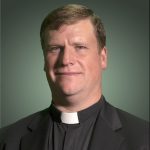June 28, 2021 // Diocese
The office of the tribunal: work that ‘touches people’s soul’
Father Jacob Runyon, judicial vicar for the Diocese of Fort Wayne-South Bend, admitted that even practicing Catholics are often confused when he tells them he is in charge of the diocesan Marriage Tribunal, the office responsible for handling annulment cases.
The tribunal is necessarily layered in secrecy. “When people share their story with us, they’re sharing the most intimate details of their life, usually talking about a very traumatic — one of the worst — failures that they have experienced,” said Anne Therese Stephens, tribunal advocate. It can be a difficult and painful experience for those involved in a divorce to relive those moments, and she sees her work as a form of ministry. All the tribunal staff members have the utmost respect for those who come to them.
Father Runyon has headed the tribunal for the last three years. Prior to that, he served as a tribunal judge. He holds a licentiate in canon law from The Catholic University of America, the only college in the U.S. that offers the program. Father Runyon supervises the tribunal staff and assigns cases to the three judges: Father Francis Chukwuma, Father Wimal Jayasuriya and himself.
“To clarify any misconceptions about the tribunal, I think the most important bit of information is that we’re like a courtroom,” he stated. Different than divorces, which are often focused on why the marriage ended, he said, “with annulments, we’re more like a fact-finding mission. What we’re trying to do is ascertain whether the marriage was valid from the beginning of the ceremony.”
Father Runyon explained that the Church understands that giving full consent to a marriage “requires certain levels of freedom, certain levels of discernment,” which may not have been present at the time the vows were spoken. “If those things are gravely lacking for some reason, then it means that the person wasn’t actually free enough to enter marriage in the first place.”
Around 80-100 cases are decided each year. More often than not, those decisions are affirmative, he reported, meaning that a true marriage never took place. The more cooperation there is between all the concerned parties, the stronger the case is and the quicker the process can move forward.
“When the case comes in, I have to evaluate it based on conscience: In my heart and in my mind, do I think there’s sufficient enough evidence to prove that the marriage wasn’t valid from the beginning?” he said.
For the judges, it is a priority to uphold the sacredness of marriage as Jesus Himself taught. But the petitioner’s parish priest can have a big impact in helping to meet the spiritual needs of those wounded by failed marriages by being a “caring and compassionate presence.” Father Runyon emphasized how critical it is for the couple’s priests to be involved in the entire process.
Advocates Stephens and Vicki Ferrier serve sort of as defense attorneys, acting on behalf of the petitioner. They are the sympathetic party, working with and on behalf of the petitioner in support of freeing them from a marriage that was flawed from the start.
Trained in canon law, Stephens describes her job as helping petitioners “marshal the evidence to be able to show the judge that there was a problem which existed from the beginning. … So together, we work to present the strongest possible case to the judge.”
The “prosecuting attorney” would be the defender of the bond, whose job it is to defend the sacred bond of marriage and look for any inconsistencies in the evidence provided, though this position is filled from outside the diocese.
“I love my job precisely because I am able to be that person whom they rely on to tell their story, with all its ups and downs, and I can be their shoulder to cry on if they need to. No matter what they did or still do, I always like to end our conversations in ‘I am hoping you know that Jesus loves you dearly and He suffers and rejoices with you.’” — Isabella Durán-Price
Ellen Becker and Isabella Durán-Price work as auditors – those who conduct interviews with the involved parties and witnesses to determine the facts of the case at the time the marriage took place. Auditors must remain neutral in their fact-gathering. Becker has been in her position for nearly 16 years and still remembers some cases she has seen through the years and hopes she has been able to help petitioners move forward with their lives.
Like Stephens, she feels the spiritual value of her work. “This touches people’s soul and their spiritual life, and that’s a whole other dimension than a divorce,” she said. Because divorce is hard on all involved, “I pray for the people I’m talking to. Witnesses as well.”
The gravity of their work is not lost on any of the staff members, who are sensitive to the impact their jobs have on the lives of those going through the process. “I feel that weight of these are real people’s lives, and I’m always empathetic when I read these people’s lives,” Father Runyon commented. In her duty as an auditor, Durán-Price says she is “able to listen and share a little bit of the pain that the parties are suffering.”
As painful as it can be for a petitioner to speak to a stranger about a broken marriage, it is also emotionally taxing for tribunal members. The anguish shared by petitioners sometimes plagues them, and they must balance their own mental health with the sorrowful stories they hear almost daily. “It’s difficult work,” Becker admitted. “When I first started, it was hard to listen to these people. I would take a lot home with me. I spent a lot of time crying, even in my office, because of the pain that these people have been through.”
“I think as an advocate, there is as form of just really being the face of Christ for people and just being able to love in the way that He loves. Because at the time that people encounter the Church, hopefully they encounter Christ.” —Anne Therese Stephens
Stephens compares the experience of being an advocate to a priest hearing confession in that she seldom remembers specific details about the person’s case, however.
The length of time the process can take is often the hardest aspect of the job, knowing that people’s lives are on hold while awaiting a decision. The goal of the tribunal is to complete the process within a year, though unforeseen factors can sometimes cause delays.
Stephens indicated that these delays can be a blessing in disguise, even though they add to the burden of the petitioners. “The people for whom I’ve seen it work the best are those who have used this time to grow in their Catholic faith and grow in their prayer life, and to increase their trust in God.”
Overseeing the tribunal has added a certain level of awareness to Father Runyon’s priestly ministry, as he can advise couples going through marriage preparation about areas that they should address before saying “I do,” yet without revealing any details about specific cases. He has seen cases come through the tribunal in which he presided over the marriage, but he is not the assigned judge on those cases.
Helping bring people back into full communion with the Church is the most satisfying part of working in the tribunal, members of the staff said. It is not always a smooth or easy process due to the “messiness of the human situation,” as Father Runyon put it, but to see a person’s case brought to justice brings fulfilment.
Further information on the nature of annulments and answers to many of the questions petitioners have prior to beginning the process can be found on the tribunal page of the diocese website, diocesefwsb.org/tribunal/.
The best news. Delivered to your inbox.
Subscribe to our mailing list today.









